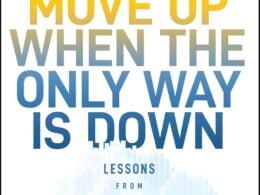The following is an excerpt from “Rise Up: Leadership Habits for Turbulent Times” by Mike Watson and Ali Grovue. Copyright 2022 by Figure 1 Publishing.
Through COVID-19, my team and I at Ignite Management Services came to understand that while resilience may not feel particularly important when times are good, it is essential when times are bad.
In January 2020, we were tremendously optimistic. We had finished 2019 strong and were looking forward to a record-setting year. This optimism led us to act on our plan for growth. We hired more people and rented a new space five times the size of our former office to serve our growing client base. On March 9, 2020, we moved into the new space with great anticipation. Then, on March 13, 2020, COVID-19 was declared a global pandemic, and on that same day we sent our staff home; our new space was nothing more than a hope for better days.
In the ensuing eight weeks, things went from good to bad to worse. It started with clients who had committed to engaging us later in the year pulling back. The growth we were anticipating was gone. And then the realities of the pandemic hit our current clients and our monthly revenue fell by 40 percent. We were staring down catastrophic monthly losses.
I know that many others faced a similar reality through COVID-19. Many had it far worse than we did. Nonetheless, the viability of keeping our team together was in doubt. Suddenly, optimism sounded almost delusional, and we were forced to step back and question what we really mean by optimism and resilience. Our business recognizes optimism as a core habit of resilient leadership. It was now being put to the test in real time. We first learned what optimism is not.
- It is not ignoring the realities of the moment and believing they will go away.
- It is not about a demonstration of positivity.
- It is not blind faith.
Optimism is about hard work. It is about confronting the realities—no matter how daunting—and dealing with them, head-on. It is about believing that this work will pay off in the end.
As we are emerging from the COVID-19 era, it is time to reflect. And I do this with a profound sense of pride in my team.
For context, Ignite is a small business. It is the primary source of income for my family, and it is our retirement plan. Losing it would have been devastating. And, admittedly, I wavered. There were days when I wasn’t my best. There were days when I was certainly my worst. And there were days when I felt very alone and wanted to give up.
During those days, I learned something else about resilience. It is not something you can have alone. It was on these dark days that my teammates gave me purpose and resolve. This became the next key learning: Resilience is a team endeavor. We cannot do it alone.
My colleagues, also, had every opportunity to cocoon, to give up. But they chose a different path. We were clear and honest with our staff and shared our reality throughout the pandemic, including information about financial losses and how long we could sustain them. The team rallied. We recognized early on that we needed to shift how we operated. We isolated the areas we needed to change and improve and set goals for our team to achieve. Each team member committed to their role and to these new goals. The pandemic year became the most successful year we have ever had.
Through this exercise, we learned that resilience is about embracing difficult situations as learning opportunities— moments to take stock, create a plan, and enact it, becoming better and stronger along the way.
Finally, what was truly reinforced throughout the pandemic is that optimism is a driving force of resiliency. It was our team’s optimism that carried us through those dark days.
“Rise Up: Leadership Habits for Turbulent Times” is available for purchase through StartupNation at the link below.






